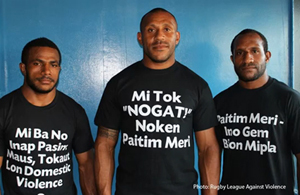AUCKLAND: (Pacific Media Watch): The media is neglecting its responsibility in covering violence against women issues in Papua New Guinea, says Titi Gabi co-chair of the Pacific Freedom Forum.
However, she sees at least one positive development.
An NGO called Rugby League Against Violence aims to reduce sexual and domestic violence in Papua New Guinea by involving rugby league clubs all over the country.
Papua New Guinea is the only country in the world where rugby league is the national sport, and rugby league players thus act as role models for the rest of the society.
 Several posters where rugby league players take a stance against domestic and sexual violence have been set up around the capital Port Moresby by the organisation.
Several posters where rugby league players take a stance against domestic and sexual violence have been set up around the capital Port Moresby by the organisation.
According to Radio Australia, the newly founded NGO is also arranging workshops to promote good attitudes.
Titi Gabi is glad the initiative has come, but stresses that much more needs to be done:
There has to be a lot of awareness on violence against women. We brought rugby players from the NRL [National Rugby League] in Australia. We’ve got buses with humongous posters of these really good-looking NRL rugby players saying ‘do not beat your wife’.
That [awareness measures] needs to be supported by laws that say, ‘look, if you beat your wife, these are the penalties’. They have to be serious.
There has got to be serious penalties.
DD: And when it comes to the reporting as such, how do you think that can be improved?
TG: I think what we need is training. We just need to open the reporters’ eyes to the fact that we are not talking enough about this, and it is happening a lot. They have got to be taught that that is news and that it is important.
We have another issue here where everybody does it. Everyone does it: your bosses, your ministers, your MPs. And I think there’s some fear of, you know, stepping on toes if you generalise the whole thing, but that’s just my view.
DD: Do you think because it is so common to commit violence against women, that the reporting of it is seen as not important?
TG: Yes, you could say that, because it is happening everywhere. I mean, there are a few good ones, a few good Samaritans there. We probably need a ‘Good Samaritan law’, so you know, if you don’t do anything you should be charged as well for just standing by and watching a woman die.”
Personal experience
Reports on Papua New Guinea’s poor record on domestic and sexual violence are nothing new.
Human rights group Amnesty International expressed its concern last month. Last November, humanitarian organisation Medecins Sans Frontieres described the situation as a ‘humanitarian crisis’.
Unfortunately, Titi Gabi has experienced a close friend of hers being subjected to domestic violence:
Another example is one of my old staff, she used to be a secretary at EmTV when I was still there. I heard six months later that she – I was looking for her, and one of my old colleagues said ‘she died’, and I said ‘how did she die?’, [the colleague answered] ‘her husband beat her to death’.
And this is a really young woman with a very young family, and the guy has been hiding. And you ask the question ‘what are his brothers doing? What is his family doing?’.
That was a very, very difficult time for me, because I was really close to her. She was like a younger sister to me.
DD: Okay Titi, a final question: I was just wondering if you have any message to news editors in Papua New Guinea and across the Pacific.
TG: Well, they make the difference. They will make a difference. They need to shift from the news agenda now, and look at what the real issues are. And violence against women is seriously on our agenda.
They need to start paying attention, because who would fall under the category of voices who hardly make the news? They need protection. They have a right.
And, you know, as long as we keep turning the blind eye and deaf ear to what the issues are, we might as well be held responsible for a lot of the deaths happening. Because that is our job.
This work is licensed under a Creative Commons Attribution-NonCommercial 3.0 New Zealand Licence.




